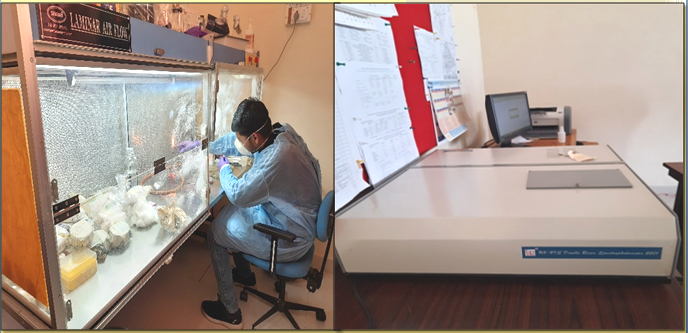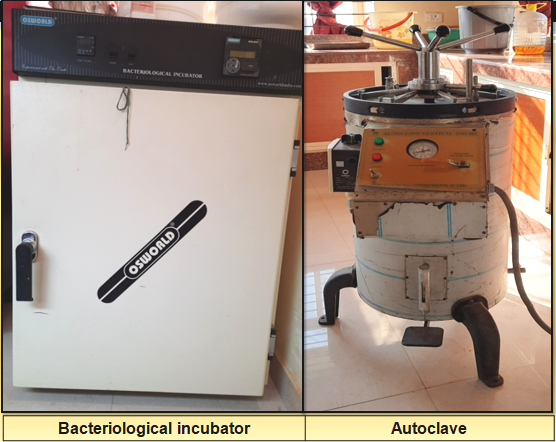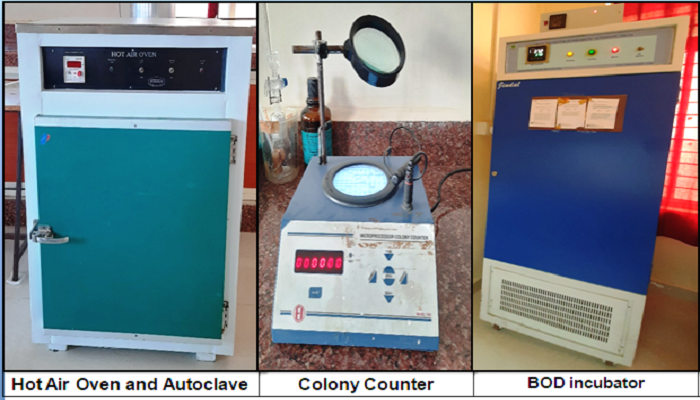Brief History
Department of Veterinary Public Health was initiated in the academic year 2007-2008.First undergraduate batch was taught in the academic year 2009-2010. First Post graduate student was admitted in the academic year 2019-2020.
Objectives of the Department
- To perpetuate the concept of Veterinary Public Health in undergraduate and postgraduate students.
- Epidemiological investigation of pathogens of animal and public health significance.
- Detection and characterization of pathogens of public health significance.
- Development and standardization of rapid diagnostic test to detect pathogens of public health importance.
- Address the veterinary public health issue through one health approach.
- Awareness of general public for zoonotic diseases, environmental hygiene and food safety.
Thrust Areas of Research
- Food borne zoonotic disease
- Water borne zoonotic disease
- Detection of vector borne disease
- Antimicrobial resistance
- Food adulteration
- Food safety
- Environmental hygiene and safety
Education
Undergraduate
| S.No. | Code of Course | Course Title | Credit Hrs |
| 1. | VPH | Unit 1: Veterinary public health and food safety | 3+1 |
| 2. | VPH | Unit 2: Veterinary epidemiology | |
| 3. | VPH | Unit 3: Zoonotic diseases | |
| 4. | VPH | Unit 4: Environmental hygiene |
Postgraduate
| S.No. | Course Code | Course Title | Credit Hrs. | Semester |
| 1. | VPE 501 | Concepts in Veterinary Public Health and One Health* | 2+0 | I |
| 2. | VPE 502 | Zoonoses - I* | 2+1 | I |
| 3. | VPE 503 | Zoonoses - I* | 2+1 | II |
| 4. | VPE 504 | Principles of Epidemiology* | 2+1 | I |
| 5. | VPE 505 | Hygiene and Safety of Foods of Animal and Aquatic Origin* | 2+1 | II |
| 6. | VPE 506 | Food-borne Infections and IntoXications | 2+1 | II |
| 7. | VPE 507 | Food Safety Standards, and Regulations | 2+1 | I |
| 8. | VPE 508 | Environmental Hygiene and Safety | 2+1 | I |
| 9. | VPE 509 | Applied Epidemiology | 2+1 | II |
| 10. | VPE 510 | Biosecurity, Bioterrorism and Disaster Management | 2+0 | II |
| 11. | VPE 511 | Laboratory Techniques in Veterinary Public Health* | 0+3 | II |
| 12. | VPE 591 | Master’s seminar* | 0+1 | I/II |
| 13. | VPE 599 | Master’s research | 30 | I/II |
Ph.D.
| S.No. | Course Code | Course Title | Credit Hrs. | Semester |
| 1. | CPE-RPE 600 | Research and Publication Ethics # | 2+0 | I |
| 2. | VPE 601 | Advances in Veterinary Public Health and Epidemiology* | 2+1 | I |
| 3. | VPE 602 | Emerging, Re-emerging Zoonoses and One Health* | 2+1 | I |
| 4. | VPE 603 | Advances in Food Safety and Quality Control of Foods of Animals / Aquatic origin* | 2+1 | II |
| 5. | VPE 604 | Biosecurity and Occupational Health Safety | 2+1 | I |
| 6. | VPE 605 | Recent Concepts in Epidemiology and Disease Forecasting | 2+1 | I |
| 7. | VPE 606 | Food plant sanitation | 2+1 | I |
| 8. | VPE 606 | Risk Analysis and Predictive Modelling | 2+1 | II |
| 9. | VPE 607 | Advances in Environmental Hygiene | 2+1 | II |
| 10. | VPE 608 | Herd Health Management and Disease Economics | 2+1 | I |
| 11. | VPE 609 | Epidemiology of Trans-boundary, Non-infectious and | 2+1 | II |
| 12. | VPE 610 | Ecology and Animal/ Human Health | 2+0 | I |
| 13. | VPE 611 | Diagnostic Approaches in Epidemiology | 2+1 | I |
| 14. | VPE 612 | Surveys, Surveillance and Data Management | 2+1 | II |
| 15. | VPE 613 | Research Methodology and Publication Ethics in VPE* | 2+0 | II |
| 16. | VPE 690 | Special Problem | 0+1 | II |
| 17. | VPE 691 | Doctoral Seminar-I* | 0+1 | I/II |
| 18. | VPE 692 | Doctoral Seminar-II* | 0+1 | I/II |
| 19. | VPE 699 | Doctoral Research | 75 | I/II |
Research
Salient Achievements
Completed Research Projects : NIL
- MPCST, Bhopal sponsored research project on “Epidemiological investigation of Brucellosis in human and animal population of Vindhya region of Madhya Pradesh”
Extension Education
A leaflets for dissemination of information for awareness regarding
- Important zoonotic diseases like brucellosis, TB & JD, Rabies,
- Vaccination schedule and
- Life cycle of Tick and transmission of vector borne diseases.
A guide for scientific animal husbandry practices
Extension education is done in camps conducted for samples collection under the research project
Publications
- Ranade, A., Singh, P.K., Shrivastav, N., Koley, S. and Chatur, Y.A. (2020). Physio-chemical properties of helf stable meat pickle from Kadaknath. Hariyana Vet. 59(1): 124-128.
- Tewari, A., Chatur, Y., Rahangdale, M. and Goswami, M. (2018) Quality analysis of raw milk procured from Rewa city, Madhya Pradesh. Journal of Veterinary Public Health, 15(2),: 83-87.
- Kurmi, B., Murugkar H.V., Kumar M., Tosh, C., Nagarajan, S., Verma, A., Tripathi, S. and Singh, V.P. (2020). Prevalence of H9N2 Avian Influenza Virus in Live Bird Markets of Eastern Madhya Pradesh. Journal of Animal Research. 10 (6):1077-1083.
Facilities Available
1. Laminar Flow Hood & UV Visible double beam spectrophotometer

2. Thermal Cycler (ABS Veriti), Electrophoresis Unit, pH meter & Digital Water Bath

3. Bacteriological incubator & Autoclave

3. Hot Air Oven and Autoclave, Colony counter & BOD incubator

Services Offered
- Antimicrobial sensitivity test
- Culture and isolation of pathogen from clinical and food samples
- Microbiological quality testing of milk, milk products, meat and meat products.
- Detection of adulteration in milk and milk products
- Detection of brucellosis by MRT, RBPT, cELISA and PCR.
- Detection of Leptospirosis by PCR/li>
- Detection of Tuberculosis by PCR
- Detection of Babesia spp., Ehrlichia spp. and Theileria spp. by PCR
- Microbiological and chemical examination of water samples
Faculty:
| S.N. | Name | Designation | Qualification |
| 1. | Dr. Baleshwari Dixit | Assistant Professor | Ph.D. |
| 2. | Dr. Yogesh Agastiji Chatur | Assistant Professor | Ph.D. |
| 3. | Dr. Anita Tiwari | Assistant Professor | Ph.D. |

